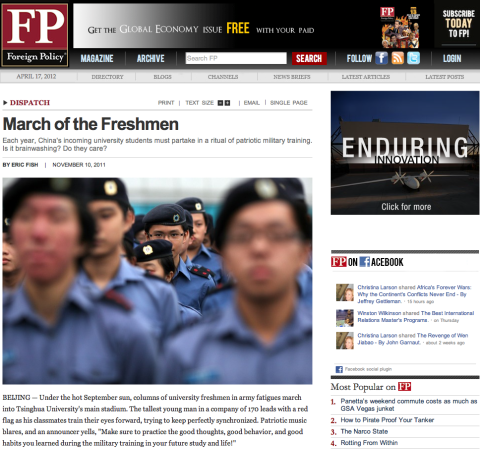
What started out as an assignment in a feature writing course for the Global Business Journalism program at Tsinghua University evolved into a major feature on the website of Foreign Policy magazine.
Eric Fish, a second-year student in the master's program co-sponsored by ICFJ, became interested in the annual ritual of several weeks of military training that most university freshmen in China have to undergo. It involves marching, physical training and patriotic education.
With the encouragement of Professor Lee Miller, Fish expanded and polished the article. Miller said he mainly asked Fish to gather more evidence to buttress various assertions. Professor Joseph Weber read a later draft and made suggestions.
Fish, 26, said the hardest part of the story was getting official sources to talk to him on the record. They are reluctant to put their careers at risk. "You have to be careful in your work," he said. "Everyone you talk to can get burned."
Fish, 26, is a native of Kansas City. He majored in political science at the University of Kansas and then taught English in Nanjing for three years. While there he started freelancing for a city magazine and then for Global Times, the English version of the People's Daily. "China is maybe the most interesting place to do journalism in the world," he said.
He decided to pursue journalism further at Tsinghua. "I have a lot of Chinese professors who are teaching us about politics and then I have international professors who teach journalism, so I have the best of both worlds." Being in Beijing has the advantage of proximity to leaders in business and politics.
He rates his Mandarin at 6 on a scale of 10. And although his mother keeps asking him when he is coming home, Fish does not see that happening soon. He hopes to land a journalism job in China with a Western media company.